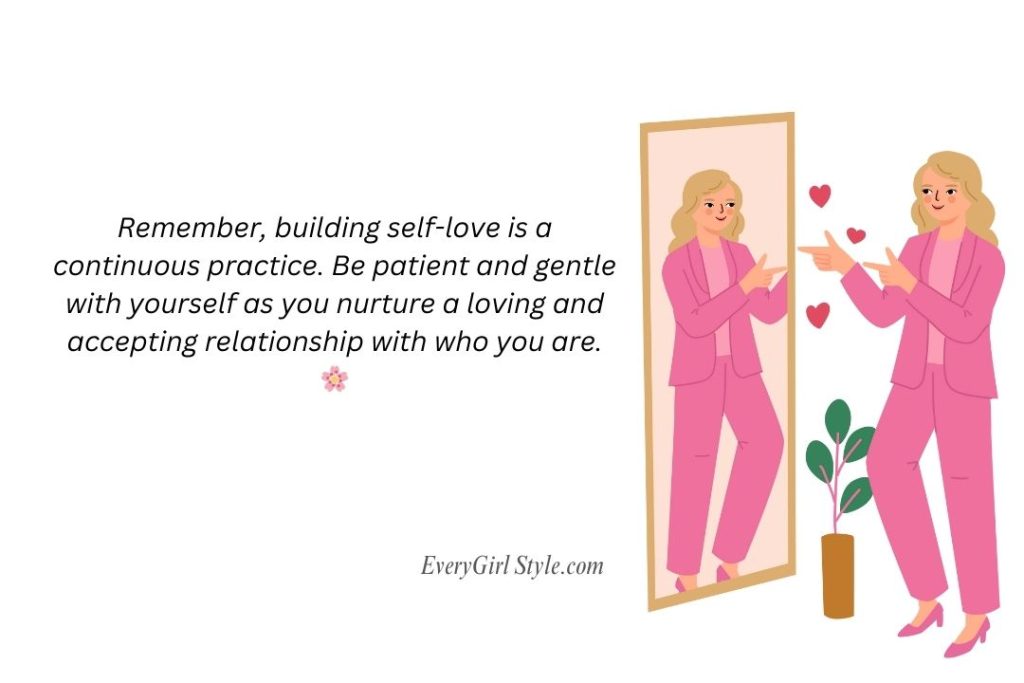when it comes to Loving yourself can feel like an uphill climb sometimes, especially when life gets overwhelming. But here’s the thing: confidence and self-love aren’t traits we’re born with they’re skills we can build over time. Did you know that nearly 85% of people struggle with self-esteem issues at some point in their lives? You’re definitely not alone in this journey!
I’ve been there, feeling stuck in a cycle of self-criticism while trying to be the rock for everyone else. It’s frustrating and exhausting! But through my own journey toward self-love and confidence, I’ve learned some valuable lessons that I’m excited to share with you.
In this guide, I’ll walk you through more than 13 simple ways to embrace self-love and grow your confidence, one step at a time. These aren’t just fluffy feel-good tips either they’re actionable practices you can start today. So, grab a coffee, settle in, and let’s take the first step toward a more confident, self-loving you.
What Does It Mean to Love Yourself?
Loving yourself might sound like a simple concept, but it’s often one of the hardest things to fully embrace. At its core, self-love is about treating yourself with the same kindness, respect, and compassion you’d offer to someone you deeply care about.
It’s about acknowledging your worth, flaws, and all and recognizing that you are enough just as you are. This isn’t about being perfect or having it all together—it’s about accepting yourself, even in the messy, imperfect moments.
Why does self-love matter? Because confidence starts from within. When you love yourself, you create a solid foundation for personal growth, healthier relationships, and the courage to chase your goals.
Without self-love, it’s easy to fall into patterns of self-doubt and seek validation from others, which can leave you feeling unfulfilled and insecure. When you genuinely value yourself, you set the tone for how others should treat you—and that’s empowering.
Check this post :20 Unique Vision Board Ideas to Manifest Your Dreams in 2025
Self-Love Isn’t Selfish It’s Necessary
One of the biggest misconceptions about self-love is that it’s selfish. There’s often this guilt associated with putting yourself first as if it’s wrong to prioritize your needs. But here’s the truth: you can’t pour from an empty cup.

Taking care of yourself allows you to show up better for others. Think of it like being on an airplane: you’re always instructed to put on your oxygen mask before helping someone else. The same principle applies to life when you prioritize your well-being, you’re better equipped to support those around you.
Self-Acceptance
Self-love begins with self-acceptance, which means embracing who you are, flaws, quirks, and all. It’s about recognizing that you are a work in progress and giving yourself grace along the way.
Nobody is perfect, and striving for perfection only leads to frustration and burnout. When you accept yourself fully, you free yourself from the pressure to meet unrealistic standards and instead focus on becoming the best version of yourself.
One way to practice self-acceptance is to shift your mindset. Instead of fixating on what you don’t like about yourself, focus on what makes you unique. Write down your strengths, achievements, and even the challenges you’ve overcome. Celebrate those things! This shift from self-criticism to self-compassion is where the magic happens.

Start with Positive Self-Talk
Your inner dialogue has more power over your confidence than you might realize. Negative self-talk—the little voice in your head that criticizes, doubts, or belittles you—can chip away at your self-esteem over time.
It’s sneaky, too, often creeping in during moments of stress or failure. Phrases like “I’m not good enough,” “I’ll never figure this out,” or “I always mess up” might feel harmless in the moment, but they shape how you see yourself and the world.
When you constantly feed your mind with negativity, you create a loop of self-doubt that’s hard to break. It holds you back from taking risks, pursuing goals, or even feeling good about small achievements. But here’s the good news: you can rewrite that inner dialogue. Positive self-talk can reframe your perspective, boost your confidence, and give you the courage to move forward.
Examples of Positive Affirmations You Can Use Daily
Positive affirmations are like little pep talks for your mind. Repeating them regularly can shift your focus from self-criticism to self-compassion. Here are some affirmations to get you started:
- “I am capable of handling anything that comes my way.”
- “I deserve love, happiness, and success.”
- “Mistakes are opportunities to grow and learn.”
- “I am proud of the progress I’ve made so far.”
- “I am enough, just as I am.”
You can say these aloud in the morning, write them in a journal, or even set reminders on your phone. The key is consistency affirmations work best when they become part of your daily routine.
Tips for Replacing Harsh Inner Criticism with Kind Words
Switching from negative to positive self-talk takes practice, but it’s absolutely doable. Here are some tips to help:
- Catch Yourself in the Act: Pay attention to when negative thoughts creep in. Awareness is the first step to change.
- Challenge Negative Thoughts: Ask yourself, “Is this really true?” or “What evidence do I have to support this?” Often, you’ll realize your inner critic is exaggerating.
- Reframe the Thought: Turn “I’ll never get this right” into “I’m learning, and every attempt gets me closer to success.”
- Talk to Yourself Like a Friend: If a friend made a mistake, would you berate them or offer kind, supportive words? Treat yourself the same way.
- Practice Gratitude: Gratitude can shift your mindset from focusing on what’s wrong to appreciating what’s right. Each night, write down three things you’re grateful for about yourself.
Identify and Celebrate Your Strengths
One of the best ways to build confidence is to reflect on what makes you unique. Too often, we focus on our shortcomings while overlooking our strengths. But when you take the time to recognize and celebrate what you’re good at, you begin to see your own value and that’s a game-changer for self-esteem.
Reflect on What Makes You Unique and Valuable
Think about your skills, qualities, and experiences that set you apart. Are you a great listener? A problem solver? Maybe you’re incredibly creative or have a knack for staying calm under pressure. These strengths might come so naturally to you that you don’t even notice them—but they’re worth celebrating.
Journal Prompts to Help You Uncover Hidden Strengths
Journaling is a powerful way to reflect on your strengths and build self-awareness. Here are a few prompts to get you started:
- What is one thing I’ve done recently that I’m proud of?
- What do people often come to me for advice or help with?
- What challenges have I overcome, and what did I learn about myself in the process?
- What compliments do I receive most often?
- What makes me feel happiest and most alive?
How Celebrating Small Wins Can Lead to Bigger Confidence Boosts
Confidence isn’t built overnight it’s the result of acknowledging small wins over time. Whether it’s finishing a project, sticking to a new habit, or speaking up in a meeting, each accomplishment matters. Celebrating these moments reminds you of your capabilities and motivates you to keep going.
Here’s how to start:
- Create a “Wins” Journal: At the end of each day, jot down one thing you accomplished, no matter how small.
- Treat Yourself: Celebrate milestones with something that makes you happy—a nice meal, a movie night, or even a walk in nature.
- Reflect on Your Growth: Look back on where you started and how far you’ve come. Progress, no matter how small, is worth acknowledging.
Set Boundaries to Protect Your Energy
Setting boundaries is one of the most powerful ways to protect your energy and build self-respect. When you establish clear limits in your personal and professional life, you’re essentially saying, “I value myself, my time, and my well-being.” Boundaries aren’t about shutting people out—they’re about creating healthy dynamics that allow you to thrive without feeling drained or taken advantage of.
The Connection Between Boundaries and Self-Respect
Boundaries are a reflection of how much you respect yourself. When you honor your needs and limits, you send a message to yourself and others that your well-being is important.
Without boundaries, it’s easy to overextend yourself, which can lead to burnout, resentment, and low self-esteem. Conversely, when you say “no” to what doesn’t serve you, you create space for what truly matters. That’s self-respect in action.
Healthy Boundaries in Relationships and Work
Boundaries can look different depending on the situation, but here are a few examples:
- In Relationships:
- Saying no to plans when you need alone time.
- Communicating your feelings instead of bottling them up.
- Refusing to tolerate disrespectful behavior or constant negativity.
- At Work:
- Not answering emails or calls after work hours.
- Taking breaks during the day to recharge.
- Delegating tasks or asking for help when your plate is full.
These boundaries help you maintain your energy, stay focused, and prioritize your mental and physical health.
Tips for Saying “No” Without Feeling Guilty
Saying “no” can feel uncomfortable at first, especially if you’re used to being a people pleaser. But it’s a skill worth mastering. Here’s how to make it easier:
- Be Direct but Kind: You don’t need a long explanation. A simple “I can’t commit to that right now” is enough.
- Practice Ahead of Time: If you struggle to say no, rehearse what you’ll say in advance.
- Remember Your Priorities: Remind yourself why you’re saying no—it’s to protect your energy and focus on what matters most.
- Offer Alternatives: If appropriate, suggest another way to help or a different time when you’re available.
- Let Go of Guilt: Remind yourself that saying no doesn’t make you selfish—it’s an act of self-care.
Prioritize Your Mental and Physical Well-Being
Your confidence is closely tied to how well you care for your body and mind. Self-care isn’t just about bubble baths or spa days (though those are great!); it’s about consistently meeting your physical, emotional, and mental needs. When you take care of yourself, you show up as your best self in every area of life.
How Self-Care Routines Can Improve Confidence
Self-care is a signal to your brain that you are worth the time and effort. It helps reduce stress, improves focus, and enhances your overall mood, all of which contribute to greater confidence. When you feel good physically and mentally, it’s easier to tackle challenges and navigate life with a positive outlook.
Mindfulness, and Rest into Your Day
- Exercise: Aim for 30 minutes of movement daily. This could be a walk, yoga, dancing, or hitting the gym—whatever feels enjoyable to you. Exercise boosts endorphins and leaves you feeling accomplished.
- Mindfulness: Practice mindfulness through meditation, deep breathing, or simply spending a few minutes being present. Apps like Headspace or Calm can help you get started.
- Rest: Prioritize quality sleep by creating a relaxing bedtime routine. Try turning off screens an hour before bed, sipping herbal tea, or reading a book to wind down.
Nutrition in Maintaining Mental Clarity and Energy
What you eat fuels not just your body but also your mind. A balanced diet with whole foods like fruits, vegetables, lean proteins, and healthy fats can improve focus, mood, and energy levels.
Stay hydrated and try to avoid excessive sugar or caffeine, as they can cause energy crashes. Remember, good nutrition is an act of self-respect and a foundation for both physical and mental resilience.
Surround Yourself with Supportive People
Your environment plays a massive role in your self-esteem. The people you surround yourself with can either lift you up or drag you down, so it’s crucial to be intentional about your relationships. Positive, supportive people encourage you to grow, while toxic ones can undermine your confidence and leave you feeling drained.
How Your Environment Affects Your Self-Esteem
We tend to absorb the energy and attitudes of those around us. If you’re constantly surrounded by negativity or criticism, it can be hard to maintain a positive view of yourself.
On the flip side, being around people who believe in you and cheer you on can make all the difference in building your confidence.
Red Flags for Toxic Relationships
Not all relationships are healthy, and it’s important to recognize the warning signs of toxic dynamics. Look out for:
- Constant criticism or belittling.
- Manipulation or control.
- A lack of respect for your boundaries.
- Excessive drama or negativity.
- Feeling drained or anxious after spending time with someone.
If you notice these red flags, it’s okay to distance yourself or even cut ties for the sake of your well-being.
Tips for Finding and Nurturing a Positive Support Network
- Seek Out Like-Minded People: Join groups or communities aligned with your interests, whether that’s a book club, fitness class, or volunteer organization.
- Invest in Quality Over Quantity: Focus on deep, meaningful relationships rather than trying to please everyone.
- Communicate Openly: Share your goals and struggles with those you trust. Supportive people will want to help and celebrate your wins with you.
- Reciprocate Positivity: Be the kind of person you want in your circle. Offer encouragement and kindness to others.
- Limit Time with Negative People: You don’t have to cut ties entirely, but reducing time spent with those who bring you down can protect your energy.
Surrounding yourself with uplifting people and prioritizing your well-being are essential steps toward loving yourself and building lasting confidence. You deserve to feel supported, energized, and at peace in your daily life!
Invest in Personal Growth and Learning
Never stop learning! Investing in your personal growth and education is a surefire way to boost your confidence and enrich your life. Whether you’re picking up a new hobby, mastering a skill, or diving into a course, continuous learning keeps your mind sharp and your self-esteem soaring.
Why Continuous Learning Builds Confidence
When you commit to learning something new, you’re not just gaining knowledge—you’re proving to yourself that you can set goals and achieve them. This sense of accomplishment reinforces your self-worth and builds a resilient confidence. Every new skill you acquire or piece of information you absorb adds to your toolkit, making you feel more capable and empowered in various aspects of your life.
Think back to the first time you learned to ride a bike or bake a cake. Remember the initial struggles and the triumphant feeling once you got the hang of it? That’s the confidence boost continuous learning can provide, day after day.
Ideas for Personal Development Goals
Setting personal development goals can be both exciting and daunting. Here are some ideas to get you started:
- Pick Up a New Hobby: Whether it’s painting, gardening, or playing a musical instrument, hobbies provide a creative outlet and a sense of achievement.
- Learn a New Language: Expanding your linguistic abilities can open doors to new cultures and opportunities.
- Take Online Courses: Platforms like Coursera, Udemy, or Khan Academy offer courses on everything from coding to creative writing.
- Develop a Skill: Focus on skills that interest you, such as photography, public speaking, or digital marketing.
- Set Fitness Goals: Whether it’s running a 5K, mastering yoga poses, or lifting weights, physical goals can enhance both your mental and physical well-being.
Choose goals that resonate with you and align with your interests and values. This alignment makes the journey enjoyable and sustainable.
Resources Like Books, Podcasts, or Online Classes
There’s a wealth of resources available to support your personal growth journey:
- Books: Titles like “Atomic Habits” by James Clear or “The Power of Now” by Eckhart Tolle offer valuable insights and practical advice.
- Podcasts: Shows like “The Tim Ferriss Show” or “How I Built This” provide inspiring stories and actionable tips from successful individuals.
- Online Classes: Websites like MasterClass or edX offer courses taught by experts in various fields.
- YouTube Channels: Channels such as TED Talks or Skillshare provide free tutorials and lectures on countless topics.
- Local Workshops: Check out community centers or local colleges for workshops and seminars that can enhance your skills and knowledge.



